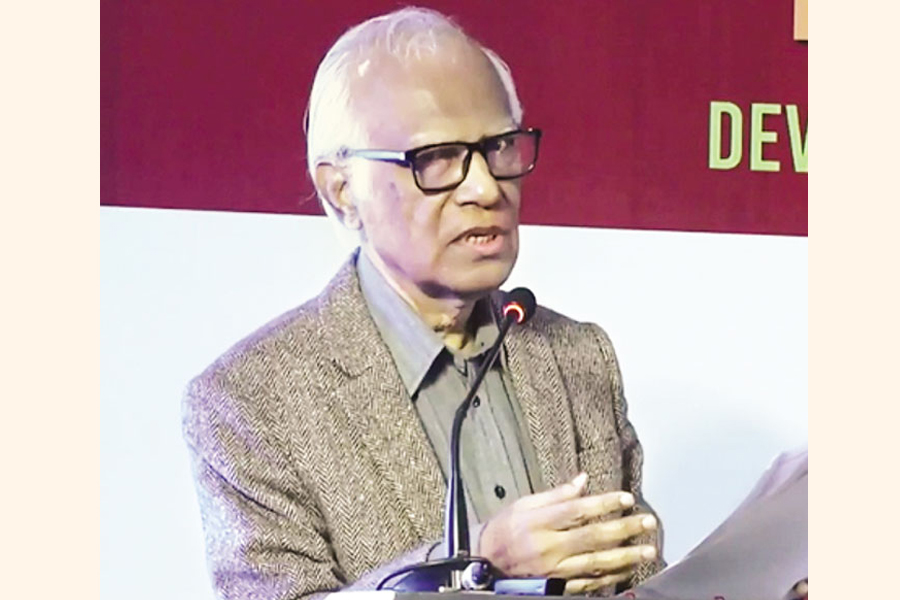
Published :
Updated :

Bangladesh has not been able to leverage the ongoing global trade and investment diversion, which resulted from attendant geopolitics and conflicts, owing to its inadequate preparations and capabilities, a noted economist said Saturday.
"Bangladesh hasn't gained much because it's ill-prepared for that sort of opportunity of such trade (diversification)," said Wahiduddin Mahmud, a former economics professor at the University of Dhaka.
He made the observation at a public lecture styled "Evolving Global Order and Geo-economics: Implications for Less Developed Countries" on the concluding day of the three-day Annual BIDS Conference on Development (ABCD) at a city hotel.
Chairman and Chief Executive of Policy Research Institute (PRI) Zaidi Sattar presided over the event.
Presenting a hypothesis on flawed governance in many less-developed countries and its implications in international trade, he said the more a regime has legitimacy in the eye of its own people that comes through popular mandate, the more will be its capacity to uphold the country's interests.
"Such a politically weak government is also more likely to succumb to the pressures of foreign governments and the multinational companies backed by the foreign governments to accept exploitative or unfair economic deals," he said.
This is one of the challenges that the less-developed countries face, he said, adding that another challenge is to do with the quality of economic management performance.
Referring to the US-China relations affecting global trade, Prof Mahmud said there has been a diversion of Western investment from China to some other East Asian countries, including Vietnam as an example.
Commenting on the trade and investment diversion, he said studies show that countries like Indonesia, Philippines, and India have benefited from that trade diversion, depending on their own capability, investment environment, and stages (of development) of their manufacturing sector.
The economist also highlighted various aspects of the global economic trend and said the immediate impact of the US-initiated trade war with China may be less visible compared to that of the Russia-Ukraine war.
"But it has the potential for a far-reaching and long-lasting effect for the entire global economy," said Prof Mahmud, who was also a member of the caretaker government in 1996.
Commenting on the BRICS' denial of affiliating Bangladesh as its member, he said: "One of the problems of countries like Bangladesh is now - which is being discussed at this moment - balancing economic partnership with the industrialised West."
Another important factor is that the energy-deficient countries like Bangladesh have to maintain appropriate relationships with the oil-exporting Middle East, which is itself caught up in an intricate geopolitics, said the economist, who is the Chairman of Economic Research Group (ERG).
Former finance minister M Syeduzzaman, BIDS DG Dr Binayak Sen, and economics professor Selim Raihan were present at the meeting among others.
Mr Raihan observed that Bangladesh has become a kind of a battleground of major players - that has been unprecedented in the last five decades - which would also affect the future course of the country's development.
Raising questions about the poor preparation of Bangladesh in terms of engagement with the free-trade agreements (FTAs), he said: "When we look back, we don't see that much of (Bangladesh's) preparation."
Responding to queries from the BIDS chief, Prof Mahmud said that the legitimacy of a government is something that can be felt but cannot be defined.
What happened in cases of countries like Singapore under Lee Kuan and Malaysia under Mahathir Mohammad were accepted by the people, he added.
"The developing countries no longer want to follow the communist countries," he said, adding that they can learn from the models.
The public organisations in Vietnam had been privatised at one point having the government's stake there, he said and added that after incurring losses at the initial stage, the enterprises became profitable and later started providing revenue to the government.
Similar has happened to China. Unlike the western economies where rich people control the politics, China has prevented such trends, he added.
Despite the political system in Vietnam cannot be questioned or debated, economic policies can be, and even accepted by the government, he noted.
Wrapping up his lecture Mr Mahmud said though he referred to Bangladesh at some points, he didn't mention Bangladesh in his paper, rather referred to less developed countries.
"These days, I never write about Bangladesh (issues). I always write about less developed countries. So that nobody can say that I'm particularly criticising something about the country," he added.
Explaining the context, Zaidi Sattar said for 75 years, following the Bretton Woods Conference in 1948, the world economy has been sort of governed by a regime which is called neo-liberal trade that focuses on trade openness, market orientation.
"That has sort of slowed down around about 2015, and we have seen the emergence of ideas like economic nationalism," he said.
Later in the question answer session he said one of the barriers for Bangladesh for signing FTA is tariff situation.
"Bangladesh has one of the highest tariffs which come first in the order of negotiation for a free trade agreement," he said.
Besides there are issues like intellectual property rights, labour, human rights, investment policies among others, he added.
saif.febd@gmail.com


 For all latest news, follow The Financial Express Google News channel.
For all latest news, follow The Financial Express Google News channel.